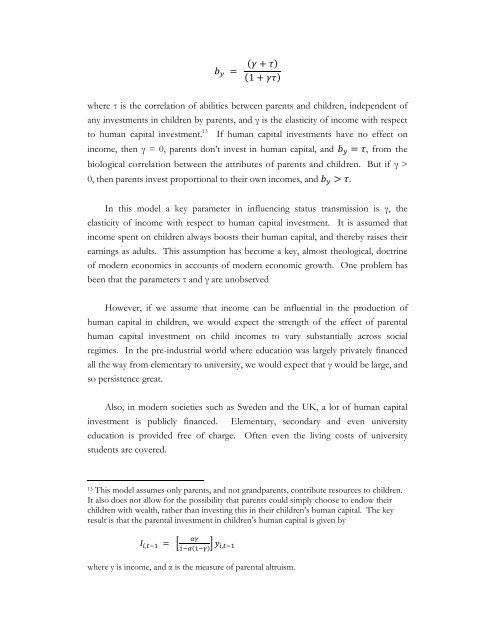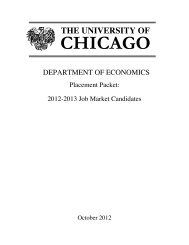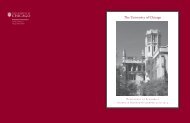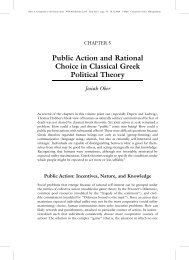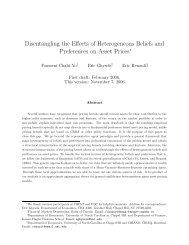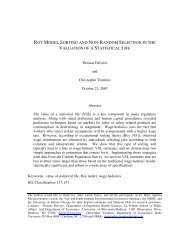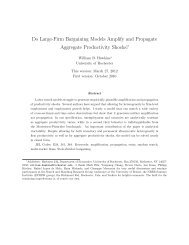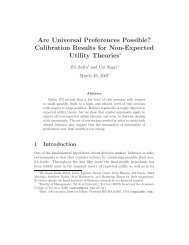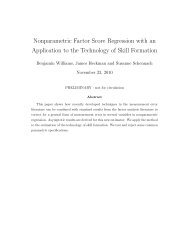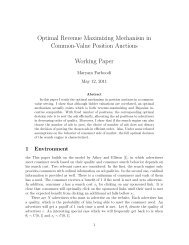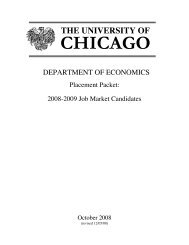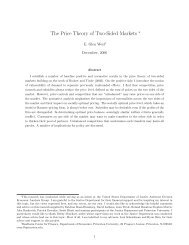Surnames and a Theory of Social Mobility - University of Chicago ...
Surnames and a Theory of Social Mobility - University of Chicago ...
Surnames and a Theory of Social Mobility - University of Chicago ...
You also want an ePaper? Increase the reach of your titles
YUMPU automatically turns print PDFs into web optimized ePapers that Google loves.
where τ is the correlation <strong>of</strong> abilities between parents <strong>and</strong> children, independent <strong>of</strong><br />
any investments in children by parents, <strong>and</strong> γ is the elasticity <strong>of</strong> income with respect<br />
to human capital investment. 13 If human capital investments have no effect on<br />
income, then γ = 0, parents don’t invest in human capital, <strong>and</strong> , from the<br />
biological correlation between the attributes <strong>of</strong> parents <strong>and</strong> children. But if γ ><br />
0, then parents invest proportional to their own incomes, <strong>and</strong> .<br />
In this model a key parameter in influencing status transmission is γ, the<br />
elasticity <strong>of</strong> income with respect to human capital investment. It is assumed that<br />
income spent on children always boosts their human capital, <strong>and</strong> thereby raises their<br />
earnings as adults. This assumption has become a key, almost theological, doctrine<br />
<strong>of</strong> modern economics in accounts <strong>of</strong> modern economic growth. One problem has<br />
been that the parameters τ <strong>and</strong> γ are unobserved<br />
However, if we assume that income can be influential in the production <strong>of</strong><br />
human capital in children, we would expect the strength <strong>of</strong> the effect <strong>of</strong> parental<br />
human capital investment on child incomes to vary substantially across social<br />
regimes. In the pre-industrial world where education was largely privately financed<br />
all the way from elementary to university, we would expect that γ would be large, <strong>and</strong><br />
so persistence great.<br />
Also, in modern societies such as Sweden <strong>and</strong> the UK, a lot <strong>of</strong> human capital<br />
investment is publicly financed. Elementary, secondary <strong>and</strong> even university<br />
education is provided free <strong>of</strong> charge. Often even the living costs <strong>of</strong> university<br />
students are covered.<br />
13 This model assumes only parents, <strong>and</strong> not gr<strong>and</strong>parents, contribute resources to children.<br />
It also does not allow for the possibility that parents could simply choose to endow their<br />
children with wealth, rather than investing this in their children’s human capital. The key<br />
result is that the parental investment in children’s human capital is given by<br />
[ ]<br />
where y is income, <strong>and</strong> α is the measure <strong>of</strong> parental altruism.


